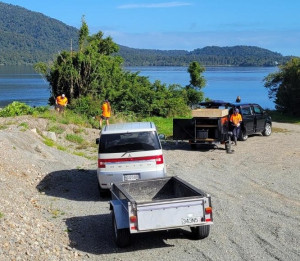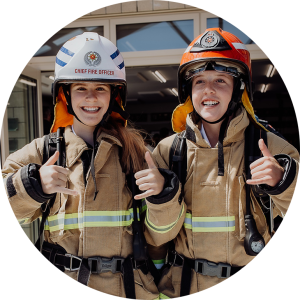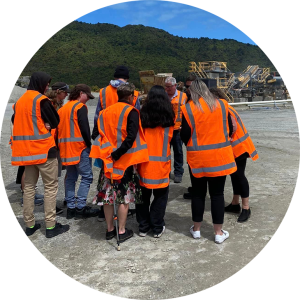Putting our plan into practice
We have made good progress across the nine actions we set out to achieve in Year 1.
On this page
Progress update – Regional Workforce Plan (RWP) year 1 actions
We have made good progress across the 9 actions we set out to achieve in Year 1. The actions address all 5 of our key focus areas. These include support for our young people, building connections, maximising our available workforce, building better workplaces, and supporting Māori.
Key focus area 1
Young people have the skills they need to meet regional forecast job growth and employer needs.
Action 1
Support the establishment of a Conservation and Biodiversity Academy/Centre of Excellence across the West Coast.
Key milestones and activities
- We have connected and engaged the key stakeholders involved in establishing the Academy including Development West Coast, the Department of Conservation and Te Pūkenga | Tai Poutini Polytechnic.
- We explored academy models including reaching out to the Energy Academy to gain insights and learnings from the establishment of the Energy Academy to help guide the establishment of a conservation academy/centre of excellence on the West Coast.
- We formed a tertiary education work group. Key activities included:
- Working with key stakeholders to identify demand for conservation training in the region.
- Compiling a stock take of current provision available on the West Coast, exploring provision options and mapping against industry needs.
- Identified suitable tertiary provision – with a focus on delivery for 2023.
- Tertiary providers are now underway with development and approvals (as required).
- Identified micro-credentials. Work is underway by a local tertiary provider on developing stackable micro-credentials in track building / maintenance.
- Establishing relationships with Workforce Development Councils.
- We have worked with schools, education providers, and industries to support:
- Experiential education programmes that provided opportunities for youth to gain insights into a range of nature related training.
- Workplace visits that connected youth and industry.
- The extension of conservation and earth care pathways available to students enrolled in secondary schools on the West Coast.
- The launch of 2 new Year 2 and 3 offerings through the West Coast Trades Academy to help meet industry skills shortages.
Key focus area 2
Maximising Te Tai o Poutini’s workforce to meet our current and future skills and labour demands.
Action 2
Address and overcome barriers to our people obtaining driver licences.
Key milestones and activities
- We have connected and engaged the key stakeholders to establish a project team – the West Coast drivers licence stakeholder group.
- A hui of key stakeholders was held to discuss barriers, initiatives, and next steps.
- Additional funding for the Salvation Army Drivers Licence programme and a driving simulator was secured for the Coast.
- The RSLG Raukawa Secretariat compiled a drivers licence research report with a focus on licensing as a barrier to training, education, and employment. The West Coast drivers licence stakeholder group reviewed this report.
- We engaged with key stakeholders including Waka Kotahi, the Ministry of Education, Ministry of Social Development, and the NZ Police to gain insights into trials/pilots, initiatives, and research/data.
- We mapped West Coast driver licence provision, providers, and referrers with input from the West Coast drivers licence stakeholder group.
- We met regularly with the Drivers Licence Implementation Programme (DLIP) Team from Waka Kotahi to stay abreast of progress to reduce barriers and enabling better access to driver licensing in New Zealand.
- The Driver Licence Training and Support Programme tender. We identified gaps in priority of provision in driver education in schools. A co-ordinated approach to tendering was established with the group supporting BullerREAP and WestREAP in their tender submissions to cover the West Coast.
Key focus area 3
Connecting our employers, educators, and workers to future-proof our labour market.
Action 3
Investigate and build programmes and initiatives to develop work ready / soft skills for youth.
Key milestones and activities
- We held a hui of key stakeholders, developed a project plan, and identified project leads.
- We completed research into soft skills and employability including Investigation into the courses available on the West Coast for youth.
- We canvased research available on work ready / soft skills including meeting with Dr Mandy McGirr who shared her learnings with us from her ‘Know your soft skills and signals’ research.
- The RSLG Raukawa Secretariat completed 2 reports:
- The first sets out the range of Government investment in education and skills. The report provides visibility of projects that have been funded by Central Government and helps to identify funding opportunities.
- The second report was on Careers Guidance and Pathways which provides a comprehensive list of support available across the Raukawa area.
- We have supported new courses that encompass ready / soft skills offered by local providers. For example, YEP Flipped and the Certificate in Supported Learning.
- We supported the West Coast Trades Academy to secure funding for oversubscribed places in 2023 enabling access to youth that would not have otherwise been able to undertake trades academy training.
- We worked with key stakeholders to enable 'Pathway Advisors in West Coast Schools' project to be extended for an additional 6 months, providing valuable pathways support to rangatahi.
- We have engaged with WDCs aligned with our RWP, including the Ringa Hora Future Skills Project which includes the development of a micro-credential that includes core transferrable essential skills.
- We engaged with Māwhera Kāhui ako to learn more about their vision and strategic plan, discuss alignment with the RWP and explore future projects we could undertake. Next steps include engaging with Westland and Buller Kāhui ako.
- We participated in several NCEA implementation hui with the community and schools.
Wahine Toa celebrate a year shaping the landscape

Photo: MBC Environmental Solutions
All 8 members of an all-women weed control crew working with MBC Environmental Solutions on a Jobs for Nature project have celebrated a year of killing invasive plants on the West Coast.
The first 3 members of the crew were graduates of the Ministry of Social Development’s (MSD) December 2021 Wahine Toa programme – an all-female employment skills course based at Te Pūkenga | Tai Poutini Polytechnic in Greymouth. The course was designed and delivered by the MSD and Connected teams on the Coast, using a Te Ao Māori approach to learning, and building participants’ confidence to re-enter the workforce. Te Pūkenga | Tai Poutini Polytechnic provided facilities, support and has offered scholarships to last year’s cohort of course graduates.
The success of this project is a brilliant example of agencies and community coming together to create employment opportunities, including MSD, Te Pūkenga | Tai Poutini Polytechnic, Development West Coast, Department of Conservation, and employers.
MBC Environmental Solutions says the work has made a huge contribution to conservation on the Coast and the women themselves report that working on the project has been nothing short of “life changing”.
Key focus area 4
Building better workplaces to be more worker friendly, flexible, and inclusive.
Action 4
Build a more detailed regional picture of current and future labour and skills needs for Te Tai o Poutini.
Key milestones and activities
- Our work this year has focused on connecting and developing relationships with the key sector leaders, employers, and WDCs. This has helped us to gain insights into regional current and future skills and labour supply and demand.
- We ran a workshop with key stakeholders to confirm our action and identify a project lead.
- We reviewed our future labour and skills needs and included it in the advice we provided to TEC.
- We have ensured that a regional voice is maintained through RSLG engagement with WDCs that are aligned with our RWP. We have also played a role encouraging stakeholders to participate in WDC engagement and workstreams.
- We supported WDCs with regional engagement.
- Along with Development West Coast, Upskill West Coast, Te Pūkenga | Tai Poutini Polytechnic, and Mayors Task Force for Jobs – Grey, Buller and Westland, we have co-created and distributed a survey to West Coast businesses to gain insights into challenges and also opportunities to support businesses in the region.
- We have been actively engaging in industry transformation workstreams, industry organisations, and groups that are aligned with our RWP.
Key focus area 5
Māori have the skills and knowledge to succeed at all stages of their careers
Action 5
Support initiatives to retrain and redeploy workers into new businesses and industries.
Key milestones and activities
- We have been busy forming strong relationships with key stakeholders and partners who have a role in retraining and redeploying workers into new businesses and industries.This has included Upskill, Mayors Task Force for Jobs (Grey, Westland and Buller Districts), MSD, Connected, Development West Coast, local education providers and support services.
- Through our connections with tertiary providers, we supported Upskill to provide information to West Coast businesses and apprentices on financial support available.
- We connected with authors of the E tū report ‘A just transition for Taranaki: views from workers and employers’ to gain insights and learnings.
- We have supported a range of West Coast initiatives, programmes and events over the year including West Coast VR Job Expos, Hospitality and Tourism Recruitment Expo, Primary Partners West Coast Networking Evening, West Coast Pathways Roadshow, Inspire to Aspire, Conservation Volunteers NZ Work Skills Programme, Wahine Toa, All in Uniform event, Jobs for Nature, and Co-starters. Stakeholders have partnered with us on several of these events.
- We participated in workshops including the Equitable Transitions Strategy workshops.
Inspire to Aspire

Photo: Hannah Gardiner Photography
The second Inspire to Aspire event, created by Westland Mayor's Taskforce for Jobs and held in Hokitika during February 2023, attracted exhibitors from across New Zealand. It included 1,200 visitors including at least 800 secondary school students from South Westland to Greymouth. The event showcased training and career opportunities available with exhibitors providing hands-on activities to encourage engagement in discussion with youth, also allowing them to develop their interpersonal skills. Development West Coast provided funding for transport to ensure students could attend.
“Inspire to Aspire was awesome. There was so much to see and do. We got to talk to people about different careers and find out what we need to do at school to get into them.”
Sophie and Grace
Actions 6 and 7
Support the regional Education to Employment broker to coordinate engagement between careers advisers and employers in our priority sectors.
Encourage local employment through business mentor programmes and in school talks by businesses to showcase industries/career opportunities and highlight skills employers are looking for.
Key milestones and activities
- We have successfully established a working group who have a project plan in place and a lead appointed. The group (West Coast Education to Employment Stakeholder group) meets fortnightly and is focused on identifying new events across the region, ways of working smarter, and best ways to share the learnings.
- The Raukawa RSLG Secretariat complied a report highlighting transitions and pathways for students across the 4 Raukawa regions.
- We supported the regional Education to Employment broker to coordinate engagement between careers advisers and employers in our priority sectors through a variety of initiatives, including:
- Industry visits – Youth (up to 24 years of age) visiting sites and attending presentations showcasing the variety of pathways and career options available on the West Coast. This included visits to Ngai Tahu Forestry, Fulton Hogan, IPL, Bathurst Mines, Westland Milk Products West Co Lumber, Cranley Farms, Department of Conservation, Jeff Evans Plumbing, Henry Adams Contracting.
- Events across the region including the Science Tour, Great Future Start Here – Inspiring Futures with guest speaker Dion Waller BCITO and Hannah Wilson (Hairdresser and Make-Up Artist who also recently appeared on Master Chef), TPP Trades Tasters. Follow-up industry visits undertaken over May and June 2023 have included JP2 year 10, Westland High Māori Students year 10 visit to TPP, and West Coast Renewable Energy Activity (STEM engagement) to engage Rangatahi.
- The RSLG partnered with Development West Coast, Ministry of Education and CATE to co-design the ‘West Coast Pathways Leadership Lunch’ on 13 June 2023. The event brought together industry leaders and school leadership to explore ways of forging stronger connections between local businesses and schools, ultimately benefiting our rangatahi.
Industry visits for rangatahi
Rangatahi are exposed to career pathways available on the Coast through industry visits co-ordinated by the regional Education to Employment broker. Key focus sectors identified in the RWP have been targeted for site visits. This initiative builds on the RWP key focus area of supporting young people to ensure they have the skills they need to meet regional forecast job growth and employer needs.
“My favourite part of our visit to Fulton Hogan has to be watching and learning about how asphalt is made as it was really interesting.”
Nick

Photo: Development West Coast
“I really enjoyed visiting IPL; it was cool to see lots of women working in the factory.”
Natalia
“One of the key benefits of visits is it allows students to be exposed to a wide range of career options and pathways they might not have previously considered. They are provided opportunities to learn from workers already in the roles, who can share their experiences and provide valuable insights into what skills are needed and what it takes to succeed in their field.”
Jade Mahuika, Education to Employment Broker
Action 8
Explore and implement programmes to assist employers to develop skills in good employment practices.
Key milestones and activities
- We have engaged with employers and key stakeholders to gain insights into good practice and to understand training and support needs and we have considered how this can be shared with other businesses.
- The Raukawa RSLG Secretariat compiled a research report titled ‘Communicating with Businesses’. It provides background information on how to enhance communication and effectively engage and share information with businesses. This research includes sources of information about employment rights for employers and employees.
- Along with Development West Coast, Upskill West Coast, Te Pūkenga | Tai Poutini Polytechnic and Mayors Task Force for Jobs - Grey, Buller and Westland we have co-created and distributed a survey to West Coast businesses to gain insights into challenges and identify opportunities to support businesses in the region.
- We are supporting a business capability workshop series led by Development West Coast where workshops covered topics such as succession planning, human resources and recruitment, finance and cashflow, sustainability, marketing – brand and strategy, and regional opportunities.
- DWC is offering business 1:1 sessions across the West Coast to help connect businesses with the right support and resources to aid them on their journey of continual improvement or to help them overcome specific challenges.
- We supported the West Coast Professional Women’s network in the planning and implementation of several events including International Women’s Day Breakfast and Inspiring Local Leaders Breakfast. The West Coast Professional Women’s Network is an open group set up to share stories and ideas, providing a networking opportunity for West Coast women.
- We supported Te Whatu Ora and Master Builders West Coast with the implementation of the Workwell programme to support construction businesses on the West Coast.
Action 9
Develop and share information with businesses about how workplaces can be more inclusive for Māori and their values.
Key milestones and activities
- We met with representatives from Te Rūnanga o Ngāti Waewae and Te Rūnanga o Makaawhio to discuss the RWP with attention on Focus Area 5 – Māori have the skills and knowledge to succeed at all stages of their careers.
- Several agencies and partners were invited to provide input and information with regard to current practices and initial thoughts on new ways of working.
- We have explored workplace inclusiveness practices for kaimahi Māori including recruitment processes, unconscious bias, and training and development initiatives.
- We have established a working relationship with Te Puni Kōkiri who attended one of our formal RSLG hui to provide an update to members on their West Coast activity.
- We are using the 2 Raukawa RSLG Secretariat reports on government funding, and communicating with businesses, as background information to help progress this action.
- We have scheduled a hui with representatives from Te Rūnanga o Ngāti Waewae, Te Rūnanga o Makaawhio to understand how the RSLG can support iwi/Māori in the labour market.
- Work has started on the development of a survey which will be sent to Māori employers on the Coast to gather their feedback to help develop meaningful priorities and actions to assist iwi/Māori.

Photo: Juergen Schacke

